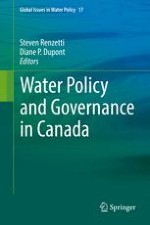2017 | OriginalPaper | Buchkapitel
13. Coordinating Water Policies: Necessary, But Not Sufficient
verfasst von : Rob de Loë
Erschienen in: Water Policy and Governance in Canada
Aktivieren Sie unsere intelligente Suche, um passende Fachinhalte oder Patente zu finden.
Wählen Sie Textabschnitte aus um mit Künstlicher Intelligenz passenden Patente zu finden. powered by
Markieren Sie Textabschnitte, um KI-gestützt weitere passende Inhalte zu finden. powered by
